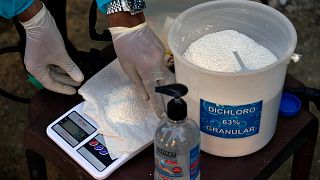Angola
Domingos Ngozulu, a resident in Angola’s capital Luanda recently lost her new-born child 24 hours after the baby suffered from respiratory problems, the family she said was kicked out of the public pediatric center of the Talatona neighborhood.
“The doctor told us that the baby was fine, she just drank amniotic fluid. There was one nurse for 20-30 patients,” recalls the 32-year-old mother.
Her baby eventually died at the Maria Pia government hospital, one of the largest health facilities in Luanda after spending a few days in an incubator, sometimes with two or three babies sharing one.
Compounded by the falling oil prices which have mostly affected oil dependent countries, Angola is now facing a health crisis.
Africa’s second biggest exporter of oil made budget cuts last October with public investment reduced by as high as 53%. The cuts, which affected essential state services like waste collection and water sanitation, have come at a high human cost – a sharp up tick in the rise of communicable diseases.
The country is battling the yellow fever epidemic and it is glaringly obvious that the country’s public health services is suffering. Overcrowded hospitals record infant mortality, acute shortage of medication and equipment are further deteriorating the situation, which could otherwise be controlled.
“The health system worked better during the war (1975-2002) because humanitarian organizations were helping us,” said Ngozulu.
“After the end of the war in 2002, they withdrew because they felt that the state was rich enough,” she added. Angola has recorded the worst rate of death worldwide among children under 5, with 167 deaths per 1,000 births.
The country is in a financial crisis which prompted the government to request for financial assistance from the International Monetary Fund (IMF) in April.













01:49
BRICS summit ends on health issues and role of global south countries
00:50
Ons Jabeur retires from Wimbledon Opener due to breathing issues
11:15
AI drones lead breakthrough against malaria in Africa [Business Africa]
01:29
Experts warn of danger of exercising in extreme heat and humidity
11:16
Angola hosts U.S.-Africa summit amid calls to revive trade ties {Business Africa}
01:02
As cholera cases surge, African leaders urge local production of vaccine